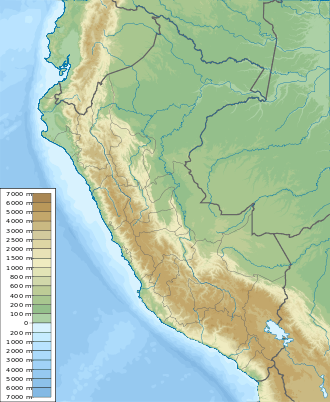Chulec Formation
The Chulec Formation (Ki-chu) is a geological formation in Peru whose strata date back to the Albian. The formation has a thickness of about 100 to 200 metres (330 to 660 ft) and comprises limestones, marls and calcareous sandstones that were deposited during a marine transgression from the west.[1] Pterosaur remains and ammonites are among the fossils that have been recovered from the formation.[2]
| Chulec Formation Stratigraphic range: Albian | |
|---|---|
| Type | Geological formation |
| Underlies | Pariatambo Formation |
| Overlies | Inca Formation |
| Thickness | 100–200 m (330–660 ft) |
| Lithology | |
| Primary | Limestone |
| Other | Marl, shale, sandstone |
| Location | |
| Coordinates | 9.9°S 77.0°W |
| Approximate paleocoordinates | 15.4°S 49.0°W |
| Region | Cajamarca & Huánuco Regions |
| Country | |
| Type section | |
| Named for | Chulec, Yauli Province |
 Chulec Formation (Peru) | |
References
- 15 km east of Huanzala Mine at Fossilworks.org
- Barrett et al., 2008, pp.61-107
Bibliography
- Barrett, P.M.; R.J. Butler; N.P. Edwards, and A.R. Milner. 2008. Pterosaur distribution in time and space: an atlas, 1–264. Flugsaurier: Pterosaur papers in honour of Peter Wellnhofer - Hone, D.W.E., and Buffetaut, É. (eds). Zitteliana B. Accessed 2019-02-15.
This article is issued from Wikipedia. The text is licensed under Creative Commons - Attribution - Sharealike. Additional terms may apply for the media files.